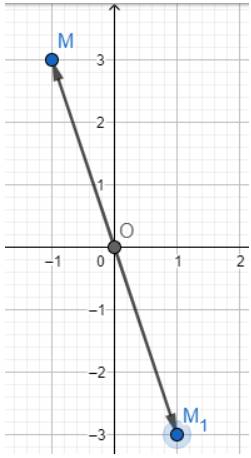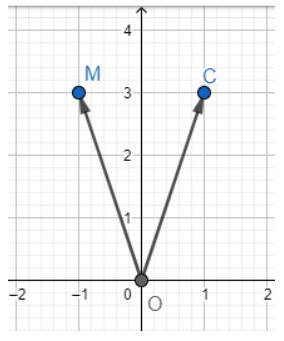Hãy nhập câu hỏi của bạn vào đây, nếu là tài khoản VIP, bạn sẽ được ưu tiên trả lời.

a) Dựa vào hình vẽ ta thấy \(A\left( {1; - 3} \right)\)

b) Dựa vào hình vẽ ta thấy \(B\left( { - 1; - 3} \right)\)

c) Dựa vào hình vẽ ta thấy \(C\left( {1;3} \right)\)


Câu 1:
Do \(\Delta\) song song d nên nhận \(\left(2;-1\right)\) là 1 vtpt
Phương trình \(\Delta\) có dạng: \(2x-y+c=0\) (\(c\ne2015\))
Tọa độ giao điểm của \(\Delta\) và Ox: \(\left\{{}\begin{matrix}y=0\\2x-y+c=0\end{matrix}\right.\) \(\Rightarrow M\left(-\frac{c}{2};0\right)\)
Tọa độ giao điểm \(\Delta\) và Oy: \(\left\{{}\begin{matrix}x=0\\2x-y+c=0\end{matrix}\right.\) \(\Rightarrow N\left(0;c\right)\)
\(\overrightarrow{MN}=\left(\frac{c}{2};c\right)\Rightarrow\frac{c^2}{4}+c^2=45\Leftrightarrow c^2=36\Rightarrow\left[{}\begin{matrix}c=6\\c=-6\end{matrix}\right.\)
Có 2 đường thẳng thỏa mãn: \(\left[{}\begin{matrix}2x-y+6=0\\2x-y-6=0\end{matrix}\right.\)
Bài 2:
Bạn tham khảo ở đây:
Câu hỏi của tôn hiểu phương - Toán lớp 10 | Học trực tuyến

Do P thuộc Ox nên tọa độ có dạng \(P\left(p;0\right)\)
\(\Rightarrow\left\{{}\begin{matrix}\overrightarrow{MN}=\left(1;-3\right)\\\overrightarrow{MP}=\left(p-2;-1\right)\end{matrix}\right.\)
Do tam giác MNP vuông tại M \(\Rightarrow\overrightarrow{MN}.\overrightarrow{MP}=0\)
\(\Rightarrow1.\left(p-2\right)+3=0\) \(\Rightarrow p=-1\)
\(\Rightarrow P\left(-1;0\right)\)
\(\Rightarrow\overrightarrow{MP}=\left(-3;-1\right)\Rightarrow\left\{{}\begin{matrix}MN=\sqrt{1^2+\left(-3\right)^2}=\sqrt{10}\\MP=\sqrt{\left(-3\right)^2+\left(-1\right)^2}=\sqrt{10}\end{matrix}\right.\)
\(\Rightarrow S_{MNP}=\dfrac{1}{2}MN.MP=5\)

M thuộc Oy \(\Rightarrow M\left(0;y\right)\Rightarrow\left\{{}\begin{matrix}\overrightarrow{AB}=\left(-2;1\right)\\\overrightarrow{BM}=\left(1;y-3\right)\end{matrix}\right.\)
ABM vuông tại B \(\Rightarrow\overrightarrow{AB}.\overrightarrow{BM}=0\)
\(\Rightarrow-2+y-3=0\Rightarrow y=5\)
\(\Rightarrow M\left(0;5\right)\)

Theo tích chất đường trung bình trong một tam giác ta có: \(\overrightarrow {PN} = \overrightarrow {BM} = \overrightarrow {MC} \) và \(\overrightarrow {MP} = \overrightarrow {NA} \)
Gọi \(A\left( {{a_1},{a_2}} \right),B\left( {{b_1};{b_2}} \right),C\left( {{c_1};{c_2}} \right)\)
Ta có: \(\overrightarrow {PN} = \left( {2;3} \right)\),\(\overrightarrow {BM} = \left( {1 - {b_1}; - 2 - {b_2}} \right)\), \(\overrightarrow {MC} = \left( {{c_1} - 1;{c_2} + 2} \right)\), \(\overrightarrow {MP} = \left( {5;4} \right)\), \(\overrightarrow {NA} = \left( {{a_1} - 4;{a_2} + 1} \right)\)
Có \(\overrightarrow {PN} = \overrightarrow {BM} \Leftrightarrow \left\{ \begin{array}{l}2 = 1 - {b_1}\\3 = - 2 - {b_2}\end{array} \right. \Leftrightarrow \left\{ \begin{array}{l}{b_1} = - 1\\{b_2} = - 5\end{array} \right.\) .Vậy \(B\left( { - 1; - 5} \right)\)
Có \(\overrightarrow {PN} = \overrightarrow {MC} \Leftrightarrow \left\{ \begin{array}{l}2 = {c_1} - 1\\3 = {c_2} + 2\end{array} \right. \Leftrightarrow \left\{ \begin{array}{l}{c_1} = 3\\{c_2} = 1\end{array} \right.\) .Vậy \(C\left( {3;1} \right)\)
Có \(\overrightarrow {NA} = \overrightarrow {MP} \Leftrightarrow \left\{ \begin{array}{l}5 = {a_1} - 4\\4 = {a_2} + 1\end{array} \right. \Leftrightarrow \left\{ \begin{array}{l}{a_1} = 9\\{a_2} = 3\end{array} \right.\) .Vậy \(A\left( {9;3} \right)\)

a) Khoảng cách từ gốc tọa độ \(O\left( {0;0} \right)\) đến điểm \(M\left( {3;4} \right)\) trong mặt phẳng tọa độ Oxy là:
\(OM = \left| {\overrightarrow {OM} } \right| = \sqrt {{3^2} + {4^2}} = 5\)
b) Với hai điểm I(a; b) và M(x ; y) trong mặt phẳng toạ độ Oxy, ta có:\(IM = \sqrt {{{\left( {x - a} \right)}^2} + {{\left( {y - b} \right)}^2}} \)

Gọi \(M\left(x;0\right)\Rightarrow\left\{{}\begin{matrix}\overrightarrow{AM}=\left(x-1;3\right)\\\overrightarrow{BM}=\left(x-3;-5\right)\end{matrix}\right.\)
Với \(x=3\) ta thấy ko thỏa mãn
Với \(x\ne3\)
Để M;A;B thẳng hàng
\(\Rightarrow\frac{x-1}{x-3}=\frac{3}{-5}\Rightarrow-5x+5=3x-9\)
\(\Rightarrow x=\frac{7}{4}\Rightarrow M\left(\frac{7}{4};0\right)\)
Gọi ptđt MN là y= ax+b (d)
Vì \(M,N\in\left(d\right)\Rightarrow\left\{{}\begin{matrix}\frac{1}{3}a+b=\frac{1}{2}\\\frac{4}{3}a+b=\frac{5}{2}\end{matrix}\right.\)
\(\Leftrightarrow\left\{{}\begin{matrix}a=2\\b=-\frac{1}{6}\end{matrix}\right.\Rightarrow y=2x-\frac{1}{6}\)
PTHĐGĐ:
\(2.0-\frac{1}{6}=y\Rightarrow y=-\frac{1}{6}\)
Vậy \(I\left(0;-\frac{1}{6}\right)\)